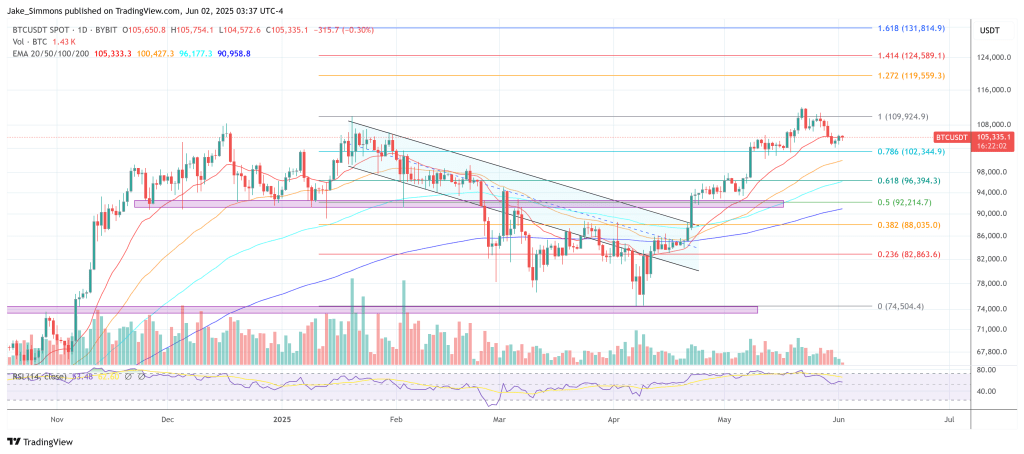Lower than per week after Pakistan unveiled a plan to channel 2,000 megawatts of surplus electrical energy into Bitcoin mines and artificial-intelligence knowledge centres, the Worldwide Financial Fund has requested Islamabad authorities for “pressing clarification” and scheduled a stand-alone digital assembly with the Finance Ministry to debate the ability allocation.
The request lands in the midst of negotiations on Pakistan’s 2025/26 price range and solely days after the nation drew a second disbursement—SDR 760 million ($1.02 billion)—beneath its $7 billion Prolonged Fund Facility, bringing complete IMF money acquired this 12 months to roughly $2 billion. The Fund has additionally accepted a parallel $1.4 billion climate-resilience programme, deepening Islamabad’s reliance on multilateral finance at a second when its external-debt maturities exceed $22 billion for the approaching fiscal 12 months, based on Fitch Rankings.
An official concerned within the IMF talks admitted that the mining announcement has difficult the lender’s due-diligence. “There’s a worry of additional robust talks from the IMF on this initiative,” the official instructed Samaa. “The financial staff is already dealing with stiff questions, and this transfer has solely added to the complexities of the continuing talks.”
Why Nation-State Bitcoin Mining In Pakistan Appears Unlikely
Daniel Batten, the New Zealand–based mostly local weather tech investor whose modelling on Bitcoin’s power profile is broadly cited in coverage debates, argues that Pakistan now finds itself on the identical collision course that derailed crypto ambitions in different debtor international locations. “Whereas I’m an optimist by nature and I actually hope I’m fallacious, I feel Pakistan will battle to observe by on its Bitcoin and Bitcoin-mining plans,” he wrote on X. “Quick reply why: IMF.”
Increasing on that time, Batten listed what he calls the Fund’s “five-fold publicity”: Bitcoin can decrease remittance prices, dilute seigniorage benefits, present another retailer of worth for foreign-exchange reserves, scale back reliance on multilateral lending and create peer-to-peer rails that sidestep capital-controls structure. “Bitcoin is a big risk to IMF in 5 methods,” he mentioned.
The analyst then turned to precedent. “IMF has already scuttled or pared again the ambitions of three out of three nations with Bitcoin adoption plans,” he famous, citing the Central African Republic’s stalled legal-tender implementation, Argentina’s settlement to anti-crypto circumstances and the incremental revisions El Salvador made to its Bitcoin Regulation. “Extremely seemingly we’ll see the identical techniques with Pakistan. Given Pakistan’s financial vulnerabilities, it’s additionally seemingly IMF might be profitable.”
In response to Batten, the Fund’s first step might be a communications marketing campaign emphasising “power shortages,” “excessive electrical energy prices,” “unclear crypto rules” and “AML considerations” as causes for warning—arguments he dismisses as “made-up.” In his view, peer-reviewed analysis exhibits Bitcoin mining can strengthen grid reliability by monetising extra provide, whereas case research corresponding to Bhutan and El Salvador display the foreign money’s potential to foster financial self-reliance. “Nonetheless, financial self-reliance reduces the customer-base for IMF as a lender, and is due to this fact not in its financial pursuits,” he wrote.
Batten provides that the leverage accessible to the Fund beneath its $7 billion Prolonged Fund Facility offers it ample room to translate warnings into programme circumstances. He predicts the IMF will demand Monetary Motion Process Drive-compliant guidelines, prohibit sovereign Bitcoin accumulation and tie future disbursements to coverage reversals, “exploiting Pakistan’s dependence on funding to keep up reserves and meet present IMF mortgage obligations.”
That dependence is stark. Batten factors out that Pakistan faces $12.7 billion in debt repayments in fiscal 2025. With out IMF assist, foreign-exchange reserves might slip under $4 billion—lower than a month of imports—echoing the January 2023 balance-of-payments disaster, when reserves fell to $2.92 billion and the rupee’s slide accelerated from PKR 100 to 330 per greenback between 2017 and at the moment. “This might set off default on different obligations, given Pakistan’s historical past of FATF grey-listing and reliance on multilateral funding,” he warns.
The stakes, Batten argues, lengthen past Pakistan. “It means the gloves are off: IMF is frightened of Bitcoin breaking apart its debt hegemony get together, and can proceed to face in the best way of Bitcoin adoption at a nation-state stage,” he wrote. Ought to Islamabad retreat beneath strain, the Fund would register what Batten calls a “4/4 monitor document” of blocking Bitcoin initiatives in debtor nations—proof, he says, of a broader technique to “oppose Bitcoin adoption from its indebted clients.”
His conclusion is blunt: “If in case you have a disruptive expertise, don’t count on the ‘disrupted’ to face idly by. They may use each method at their disposal to protect the monopoly they’ve loved.” For governments intent on pursuing Bitcoin, Batten sees solely two viable paths: “Be like Bhutan or the US, who don’t want the IMF, or have a backup lending plan in place so the IMF can’t strain you into rolling again your insurance policies and plans.”
At press time, BTC traded at $105,335.

Featured picture created with DALL.E, chart from TradingView.com

Editorial Course of for bitcoinist is centered on delivering completely researched, correct, and unbiased content material. We uphold strict sourcing requirements, and every web page undergoes diligent overview by our staff of high expertise specialists and seasoned editors. This course of ensures the integrity, relevance, and worth of our content material for our readers.









